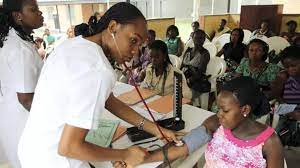Ahead of the 2018 World AIDs Day, the Minister of Health, Isaac Adewole, has explained why Nigerians need to know their HIV status, in line with the theme for this year’s commemoration of the global event.
The World AIDS Day is marked every December 1 to encourage communities to unite against HIV, show support for people living with the disease, and remember those who have passed away due to AIDS.
The theme for the Day this year, which is on the 30th anniversary of the first celebration of the World AIDS Day, is “Know Your Status.”
The Joint United Nations Programme on HIV and AIDS (UNAIDS) set the 90-90-90 target, the first 90 being for 90 percent of people to know their HIV status by 2020.
The two other aspects of the target are that 90 percent of all people diagnosed of HIV receive sustained anti-retroviral therapy, and 90 percent of the people receiving antiretroviral therapy have viral suppression.
Speaking at the 2018 World AIDs Day commemoration event held at the Banquet Hall of the State House in Abuja on Thursday, Mr Adewole, a professor, said everyone taking step to know his status would enable Nigeria meet the first 90 target by 2020.
He said the theme for 2018 was chosen to emphasise the need for people to know their HIV status and also to remove barriers to HIV testing.
According to Mr Adewole, only 38 percent of Nigerians know their status, which leaves a big gap between attaining the first 90 target by 2020.
The minister said attaining the first target is key to attaining the second and third of the 90-90-90 target.
Assuring of government’s continued efforts to remove identified barriers to testing, Mr Adewole urged the public to lend a helping hand to people living with HIV and stop discrimination against them.
He noted that the success story in the field of HIV has been remarkable, as Nigeria is moving towards eradication of the disease by 2030.
In his remarks, the Director-General of the National Agency for the Control of AIDS (NACA), Sani Aliyu, stressed that AIDS response has made a significant progress, as people living with HIV can lead healthy and productive lives.
He noted that the results from the ongoing National HIV survey will improve understanding of the Nigerian HIV epidemic and provide more accurate and reliable data for planning and decision-making.
Mr Aliyu said NACA was working on strengthening engagement with the private sector in Nigeria through the Nigeria Business Coalition Against AIDS (NIBUCAA) in a bid to increase domestic funding for HIV, towards a more sustainable response.
In his goodwill message, a senator, Mao Ohabunwa (PDP, Abia North), said HIV pandemic is still an emergency that should be focused on.
He said the pandemic requires urgent strategy to tackle it directly from the known sources of the transmission of disease and with improved support from government.
Mr Ohabunwa called for special attention to sex workers, those suffering from hard drug exposure and those having HIV-related diseases such as tuberculosis.
He said adequate funding for testing support and treatment for those already undergoing anti-retroviral treatment, especially women and children, will also go a long way in the fight against the disease.
The lawmaker urged government at all levels to increase the avenues through which necessary HIV services including voluntary and mandatory testing services are rendered to all.
In his goodwill message, the US ambassador, Stuart Symington, said AIDs-related deaths worldwide have fallen by 50 per cent since the peak in 2005, just as the number of new HIV infections has reduced by 47 per cent since 1996.
Represented by the deputy mission director, David Young, Mr Symington said the US government in partnership with the government of Nigeria, has protected millions of Nigeria from being infected by and dying from HIV.
“In 2018 alone, PEPFAR provides life-saving HIV treatment to over 800,000 Nigerians, including men, women and children.
“Approximately 7.4 million Nigerians have received HIV counselling and testing services. More than 1.6 million pregnant Nigeria women were
tested for HIV and 1.2 million orphans and vulnerable children received care and support services,” he said.
The ambassador said the US government has invested more than $5 billion in national HIV/AIDS response in Nigeria.
He said for progress to be made on the 90-90-90 standards, people must first know their status.



